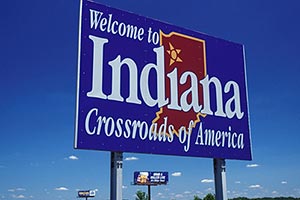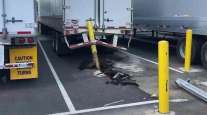Indiana Lawmaker Aims to Raise Speed Limit for Trucks

An Indiana lawmaker is trying to eliminate the lower speed limit for trucks on interstate highways.
Rep. Michael Aylesworth (R-Hebron), has introduced a bill that would enact uniform speed limits for cars and trucks on rural interstates authorizing trucks to travel 70 mph.
Aylesworth tried to change the speed limit during the 2015 regular session, but the bill was not considered in committee.
"We've got an old tradition of having the trucks move 5 miles per hour slower," Aylesworth said. "It's just a cumbersome thing, and it really needs to be smoothed out so we're all traveling the same speed."
As he traveled the country visiting relatives, Aylesworth said he noticed that the highway speed for trucks was the same as cars and decided to introduce a bill that would change the legislation in Indiana. The state is one of five that require trucks on rural interstates to travel at slower speeds than cars. In Indiana, trucks are authorized to travel 65 mph on rural interstates, 5 mph slower than cars.
Aylesworth said he believed that changing the speed limit would help facilitate a better flow of traffic on the highways, making it easier for all motor vehicle operators.
"If the highway speed for trucks is the same as cars, it would make the traffic move evenly," he said, adding that the difference in speed limits impedes the flow of traffic when it takes miles for a car to pass a truck on the freeway.
"Plus, it's an economic issue, too, because the payloads of the trucks aren't delivered quite as fast as they are in other states.
Officials at the Indiana Motor Truck Association (IMTA), the state's only motor truck association, do not support the bill.
"Our association and our members continue to believe that 65 mph is fast enough for trucks," IMTA President Gary Langston said.
Langston said he disagrees with the theory saying that cars and trucks should go the same speed because there would be less interaction between cars and trucks.
"If we let trucks go 70, that means cars are still going to go faster than trucks because cars don't want to be around trucks," he said. "If you're behind a truck, you're objective is to go around that truck. It doesn't matter how fast the truck is going."
Langston said his primary concern is the potential danger he believes passing this bill would pose to all drivers on the highway.
"Trucks are big and heavy and don't stop as quickly as cars," he said. "It's only logical that if trucks are going faster, it's going to take longer to stop and longer to respond to defensive situations."
When asked if he thinks this bill could pose a threat to the motoring public, Aylesworth said he hasn't seen any statistics that suggest raising the speed limit would make it less safe for people operating vehicles on the highway.
In 2015, there were 105 fatal crashes in Indiana involving large trucks, according to a report from the U.S. Department of Transportation. That was the ninth most in the country. However, the data do not specify the reason for the crashes.
In 2015, the majority of fatal crashes involving large trucks that happened nationwide occurred when trucks were traveling at speeds between 50 and 75 mph. A little more than 34% occurred when trucks were traveling 50-55 mph; 21% when trucks were traveling 60-65 mph; and 19.2% when they were traveling 70-75 mph, according to the report.
Despite his enthusiasm for getting this bill through, Aylesworth has tempered his expectations after his bill was not heard in committee two years ago.
"I have no idea whether the committee chair wants to hear it or not this time around," Aylesworth said. "But it makes sense and is an important issue."
The bill, HB 1016, awaits consideration in the House Roads and Transportation Committee.


